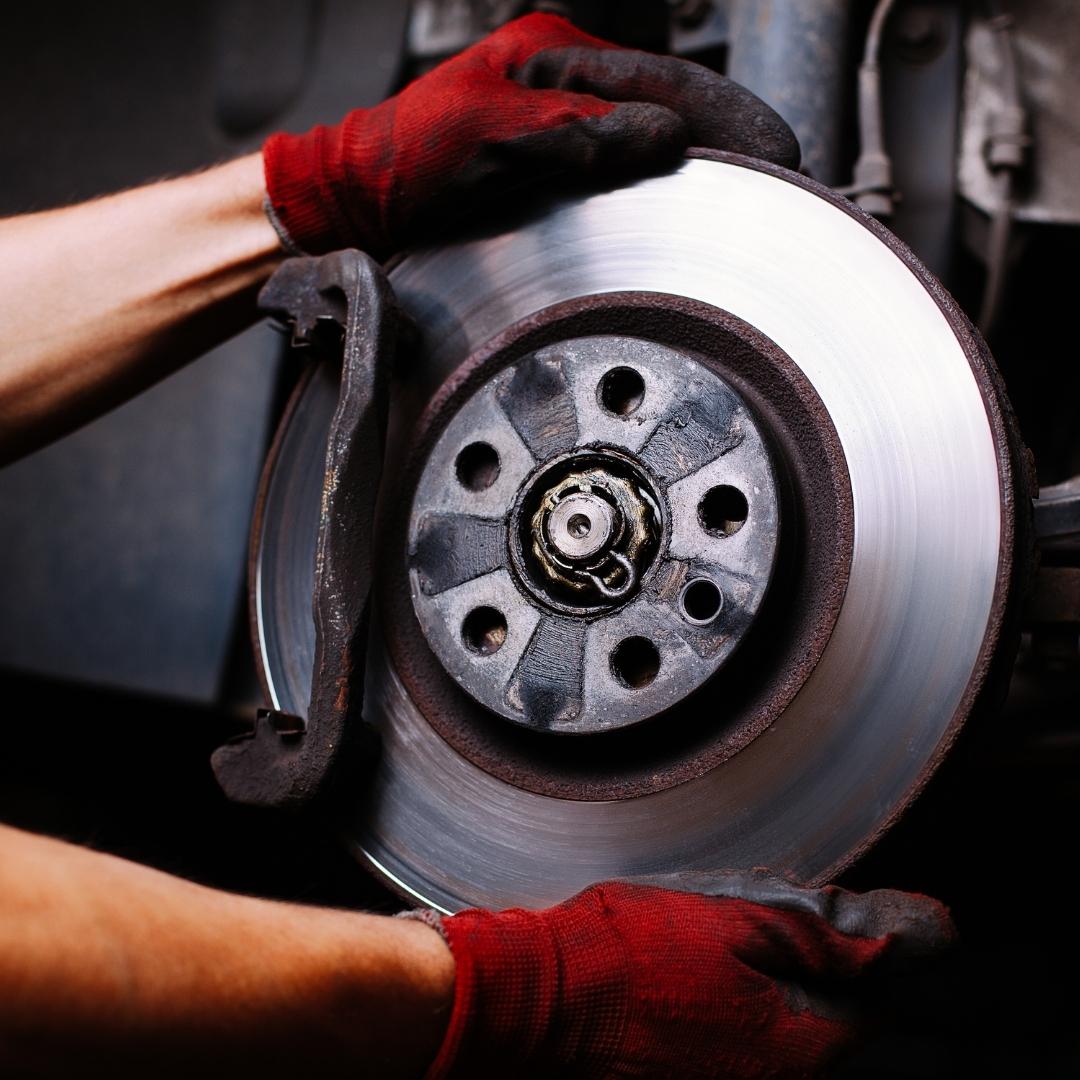November 3, 2024
Maintaining Disc Brakes
brake service is one of the most common repairs our technicians perform daily. While brake service or replacement is inevitable, there are many ways to maintain your brakes and prolong a trip to the mechanic. Proper brake maintenance is easy–if you know what to look and listen for.
Let’s take a look at how to make your brakes last longer.
How Do Disc Brakes Work?
Before we get into proper brake maintenance, it’s important to understand the different parts we’ll be talking about. Most drivers are only familiar with the part they interact with when braking: the pedal.Within a braking system, we have the pedal, master cylinder, wheel cylinders, pistons, pads, rotors, metal tubes, and flexible hoses that move essential liquids. Many modern cars also have sensors that alert drivers of worn brakes or work with ABS systems.
When you press the pedal, you should immediately feel the brakes engage. As you press down, hydraulic fluid in the brake lines pressurizes, which engages the pistons and pushes the pads onto the rotor. Pressing the brake pedal harder creates more pressure within the brake lines and causes the pistons to push the pads against the rotor more firmly. As you remove your foot from the pedal, the hydraulic fluid depressurizes, and the pads retract a few millimetres into the callipers.

Disc Brake Care
Understandably, most drivers don’t feel comfortable performing brake repairs or replacements themselves. At Master Mechanic, we don’t advise you try to do this work yourself unless you have the experience. Many modern cars have sensors that need to be recalibrated by a mechanic to ensure they continue to work properly after service. That said, there are many things you can do to prolong the life of your brakes and save money on maintenance.
Don’t Slam on the Brakes!
Brakes are there to help you drive safely. This includes avoiding a sudden collision, and sometimes, sudden braking is unavoidable. Whenever possible, you should brake lightly and come to a rolling stop. If you continuously brake suddenly, you may risk warping your brake discs. Not only does this increase the wear on other parts, it also lowers the driving performance and comfort of your car.
The Importance of Brake Fluid
Brake fluid is a vital component of your car’s braking system, ensuring that your vehicle stops effectively and safely. Here’s why it’s so important:
1. Hydraulic Force Transmission:
- Brake fluid transfers the force you apply to the brake pedal into pressure, activating the brake pads or shoes to slow or stop the car.
- It ensures consistent and reliable braking performance under various driving conditions.
2. Heat Resistance:
- Braking generates significant heat, especially during extended or heavy braking. Brake fluid is designed to resist high temperatures and maintain its performance without boiling.
- If brake fluid boils, it can create vapor pockets in the brake lines, leading to a spongy pedal feel or brake failure.
3. Prevents Corrosion:
- Quality brake fluids contain additives that protect metal components within the braking system from corrosion and rust.
- This extends the lifespan of crucial parts like the master cylinder, calipers, and brake lines.
4. Moisture Absorption:
- Brake fluid is hygroscopic, meaning it absorbs moisture from the air over time. This is important because:
- Moisture can lower the boiling point of brake fluid, making it less effective.
- It can cause internal corrosion and reduce the lifespan of brake components.
Signs You May Need Brake Fluid Service:
- A soft or spongy brake pedal.
- Reduced braking efficiency.
- Brake warning light illuminated on the dashboard.
- Leaking brake fluid (usually clear to yellow and oily).
Maintenance Tips:
- Regular Inspections:
- Check your brake fluid level regularly (refer to your owner’s manual for guidance).
- Ensure the fluid is clear or light amber; dark or dirty fluid indicates contamination.
- Flush and Replace:
- Most manufacturers recommend replacing brake fluid every 2-3 years or as specified in your owner’s manual.
- Regular flushing prevents moisture buildup and ensures optimal braking performance.
- Use the Correct Type:
- Only use the type of brake fluid specified for your vehicle (e.g., DOT 3, DOT 4, or DOT 5). Mixing incompatible types can damage the braking system.
Why It’s Critical:
Neglecting brake fluid maintenance can lead to:
- Reduced braking power.
- Corrosion of brake components.
- Increased risk of brake failure, especially during emergencies or under heavy braking.
Proper brake fluid care ensures your car stops safely when you need it most, protecting you and your passengers on the road.
Listen to Your Brakes
When your brakes aren’t happy (and need service), they’ll typically tell you. Depending on the issue, you may notice a hissing or squealing when you press the brake pedal. A sharp hiss when braking usually means you’re running low on brake fluid. Be sure to monitor the response time of your brakes and drive very carefully until you have your brake fluid replaced. We advise doing this ASAP!
The infamous brake squealing is something almost every driver is familiar with. We know your brake pads are responsible for stopping your vehicle by making contact with the rotor.This is also when you’ll begin to hear the familiar squealing, which is simply a ‘warning sound’ designed to tell you it’s time for a replacement. As your pads wear, a metal tab is exposed and begins to rub slightly against the rotor to alert drivers.
